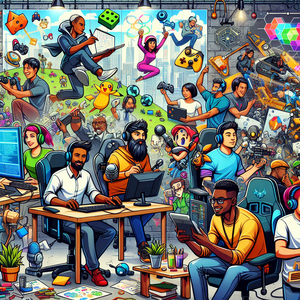
Unveiling Exciting Career Paths in the Thriving World of Video Games
The video game industry stands as one of the most dynamic and rapidly expanding sectors worldwide. With a diverse range of career opportunities that blend both creative and technical skills, this field is attracting a growing number of professionals eager to innovate and shape the future of gaming. As technology continues to evolve, so does the market, driven by the rise of esports, mobile gaming, and immersive experiences like virtual and augmented reality. This article aims to provide a comprehensive overview of various roles within the gaming industry, enriched with insights into job growth, salary expectations, and essential skills, making it an invaluable resource for anyone considering a career in this exhilarating domain.
Job Summaries:
Game Designer:
- Game designers are the visionaries behind the gaming experience.
- They craft gameplay mechanics and the overall player journey.
- Their role demands a mix of creativity, storytelling prowess, and a deep understanding of game mechanics.
- Typically, a degree in game design or a related field is essential.
- Familiarity with design software and game engines is also important.
Game Programmer:
- As the technical backbone of game development, game programmers transform ideas into playable realities through coding.
- Collaborating closely with designers, they troubleshoot issues and optimize gameplay across various platforms.
- Proficiency in languages like C++, C#, or Java, along with experience in game engines such as Unity or Unreal Engine, is often required.
Game Producer:
- Game producers act as project managers.
- They oversee the entire development process.
- They ensure timely and budget-friendly completion.
- They facilitate communication across departments.
- Strong organizational and leadership skills are paramount.
- Experience in business or project management often backs these skills.
Game Tester:
- Quality assurance (QA) testers, or game testers, are responsible for evaluating games to uncover bugs and gameplay issues before release.
- Attention to detail and effective communication skills are crucial for this role.
Game Artist:
- Game artists are tasked with creating the visual components of games.
- They create character designs, intricate environments, and animations.
- A strong portfolio showcasing artistic talent is essential.
- Proficiency in tools like Adobe Creative Suite and 3D modeling software is essential.
Community Manager:
- Community managers serve as the bridge between developers and gamers.
- They foster engagement through social media and gaming forums.
- Excellent communication skills are vital.
- A solid understanding of the gaming community is vital.
Esports Producer:
- As the esports scene continues to gain traction, esports producers are increasingly crucial in organizing tournaments and live streams.
- They collaborate with developers, sponsors, and broadcasters to create exciting events.
Marketing Executive:
- Marketing executives are responsible for devising strategies that promote games and engage players.
- They analyze market trends to launch effective marketing campaigns.
Game Animator:
- Game animators breathe life into characters and environments through movement.
- Proficiency in animation software and a strong portfolio are necessary.
Audio Engineer:
- Audio engineers craft the auditory landscape of games.
- They design sound effects, music, and voiceovers.
- A background in audio engineering or sound design is typically required.
Game Writer:
- Game writers are responsible for developing narratives and crafting dialogue that resonates with players.
- Strong writing skills and creativity are fundamental.
Technical Support Specialist:
- Technical support specialists assist players with technical challenges, ensuring a seamless gaming experience.
- Excellent problem-solving skills and a solid understanding of gaming hardware and software are essential.
Game Localizer:
- Game localizers adapt games for different languages and cultures.
- Ensuring relevance for global audiences.
- Fluency in multiple languages is essential.
- Cultural knowledge is essential.
Level Designer:
- Level designers create engaging gameplay environments
- Focusing on balance
- Thematic coherence with the game's narrative
User Experience (UX) Designer:
- UX designers enhance the player experience
- Analyzing user interactions
- Ensuring games are intuitive
- Ensuring games are enjoyable
Game Producer (Mobile):
- Mobile game producers manage the unique challenges associated with developing games for mobile platforms
- Challenges include touch controls
- Challenges include varied screen sizes
Game Publisher:
- Game publishers oversee marketing, distribution, and sales.
- They ensure that developers successfully launch their games.
Game Data Analyst:
- Game data analysts gather and interpret data on player interactions
- Guide design and marketing decisions
Game Marketing Manager:
- Game marketing managers develop and oversee comprehensive marketing strategies.
- They include community engagement and campaign management.
Game Development Educator:
- Game development educators impart essential skills to aspiring industry professionals.
Exploring these diverse career paths allows individuals to align their passions and skills with rewarding opportunities in the gaming industry. With the sector’s continuous growth and transformation, there are ample prospects for those looking to make their mark. For those considering a career in gaming, staying updated on current job openings and industry trends is key to finding the perfect fit.
Explore More Jobs

